Descendant of Hetman Polubotka - Chief Gendarme of Russia
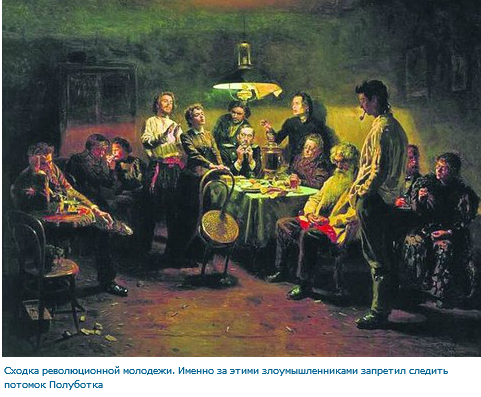
Lieutenant-General Vladimir Fyodorovich Dzhunkovsky was a man in whose biography tragic and comic elements intertwined most wonderfully. A descendant of an ancient Little Russian family, descended, according to legend, from the Tatar Khan Junke. A graduate of the privileged Page Corps in St. Petersburg, who supplied the Russian Empire with cadres of guards cavalry officers and ... Governor-General - this is the educational institution graduated by the author of famous memoirs “50 years in the ranks” Count Ignatiev. Long-time adjutant of Grand Duke Sergei Alexandrovich, who for forty years failed to rise above the captain, and the combat commander of the 15 Siberian Rifle Division during the First World War.
A fighter against drunkenness and the founder of the Museum of the Battle of Borodino near Moscow. Beekeeper and gendarme. Convinced monarchist and consultant Felix Dzerzhinsky. Who was he really? And God knows! Personally, I have neither the strength nor the desire to condemn or glorify one of the last commanders of the Separate corps of gendarmes of the Russian Empire. But his biography makes it possible to better understand the unwritten laws of the highest bureaucracy of pre-revolutionary Russia, and thanks to what talents the “cadres” occupied their posts, leading the secret police and bees, alcoholics and Siberian shooters with equal success. This is all the more instructive that, according to the same laws of acquaintance and "incident", the party nomenclature of the stagnant USSR and the current political "elite" of independent Ukraine were formed.
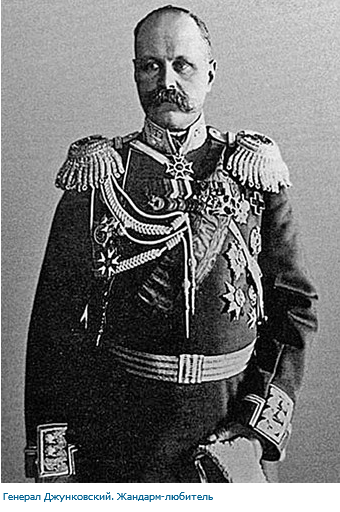
It seems to be nothing in common, at first glance, there is not between the pre-revolutionary lieutenant-general in luxurious epaulets and the modern "menager", as the top managers jokingly call it, in a suit and tie. And you look at how both jump from post to post, leaving ruins behind them, and you understand: honest people, good ones, but it would be better to keep them on a chain and not to allow any cause!
Among other things, in history In Russia, Vladimir Dzhunkovsky entered as a man who attempted to eliminate Rasputin from the royal entourage and reorganize the activities of the gendarmerie on the basis of sincerity and nobility. When I entered 1913 for the position of commander of the gendarme corps, our hero announced the principles of his future activities to his subordinate in the first order: “Noting the main leaders of the beginning of the Gendarme Corps, I hope that in the officer's environment I will meet those qualities that the Russian army is proud of, namely, the spirit of camaraderie, mutual trust and noble frankness in relation to superiors, to each other and to subordinates. Deviations from these principles I will not tolerate. ”
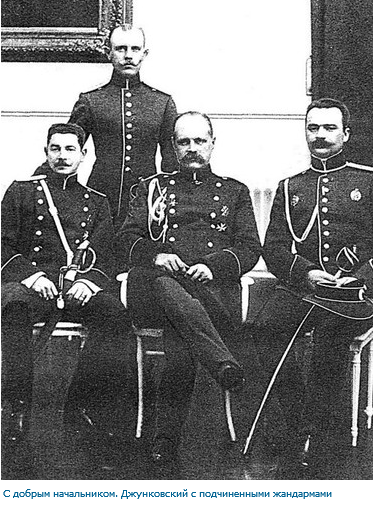
The creators of the recently filmed Russian documentary, which is dedicated to the biography of Dzhunkovsky, simply admire their hero. That, they say, what was the man! Meanwhile, the activities of the new chief gendarme paralyzed the intelligence work of his entire department. Barely taking office, Dzhunkovsky found that the agents of the secret police are often very respected people, even to the deputies of the State Duma. For any real gendarme, this would be an indicator of the high quality of the work of his subordinates. But not for Vladimir Fedorovich as an amateur gendarme. “Disorder!” He decided, and immediately began rebuilding the activities of the secret police on the basis of Leo Tolstoy’s methods of love for his neighbor.
In addition to the post of gendarme corps commander, Dzhunkovsky was also deputy minister of internal affairs. Then this post was funny called "Comrade Minister". What could the new chief, who had previously served only as Moscow governor-general and adjutant of the Grand Duke, advise his subordinates to his subordinates? Nothing! How, then, show the mind?
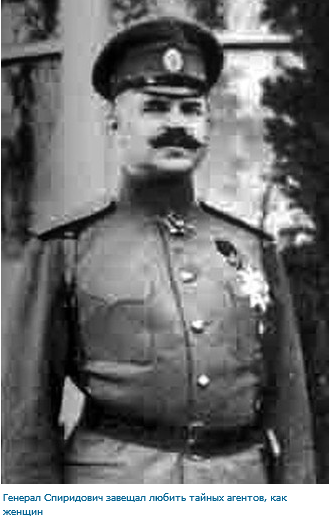
Naturally, finding flaws in the work - not so collect information. And in his memoirs, like any former high-ranking honest fool, Dzhunkovsky admits this with charming simplicity, which, as is well known, is worse than theft: “I often mentioned Beletsky on reports that he had such information from“ Ix ” , but it never occurred to me that this “X” was none other than Malinovsky, but to ask Beletsky who this “X” was, I considered it unnecessary for myself and never had any interest in what his secret employees were without condescending to this. "
The mentioned Stepan Beletsky is the director of the Police Department. General's position! The Police Department is a department in which all security departments of the Russian Empire were included. It was they who caught the revolutionaries who tried to change the state system by means of agitation and terror. The revolutionaries staged uprisings, published subversive literature, "drenched" the governors and ministers. It was they who, by the way, tore the former Chief of Dzhunkovsky, Grand Duke Sergei, who had left the Kremlin on a sled to the bathhouse, in 1905, in a year.
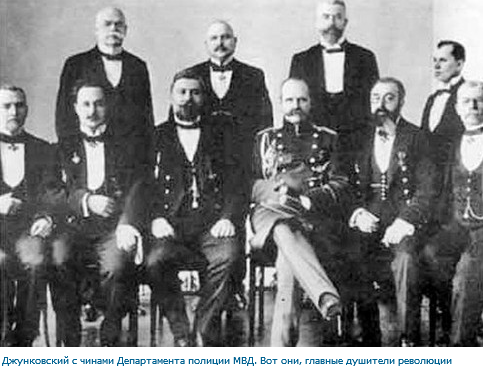
Naturally, the police sought to have agents in the environment of the revolutionary underground. Some of these secret employees grew well in the revolutionary hierarchy and enjoyed the confidence of their party comrades, who were “pounded” at the Police Department, and one of them, Roman Malinovsky (a man denounced by Lenin himself!), Even became a deputy of the Lenin RSDLP. It was a liberal democratic tsarist Russia with legal elections and an independent court!
What is wrong if the State Duma deputy Malinovsky is aware of all the affairs of the underground workers and regularly reports them to his police superiors? Yes, with such a person dust should be blown off! The most valuable agent! But a completely different opinion was about this situation the new deputy minister. Between him and the director of the Police Department Beletsky, who was in charge of secret agents, a conflict soon arose.
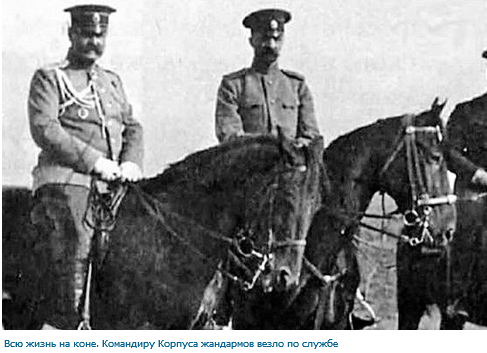
Beletsky was the exact opposite of Dzhunkovsky. The only thing that united them was the Ukrainian origin. But the son of General Dzhunkovsky was brought on a silver platter, and Beletsky was promoted to his general's position in the police force from ordinary Chernigov burghers. He graduated from the law faculty of Kiev University at his own expense. Vladimir, entered the office of the Kiev Governor-General, for a long time pulled a service strap in various positions, slowly rising up, until he liked his well-known qualities Interior Minister and at the same time Prime Minister Peter Arkadyevich Stolypin. So he got to the Police Department, which was close to him in connection with legal education, and he was there the last great reformer.
It is Beletsky who is honored to organize the interception of telephone conversations. Russian police have been engaged in the opening of letters since the 18th century, not lagging behind their foreign colleagues in anything. She read the correspondence of ambassadors, conspirators, spies. It was the interception of one of the letters sent by regular mail that made it possible to uncover a conspiracy to murder Alexander III, in which Lenin's elder brother participated. But it was our countryman Stepan Petrovich Beletsky, the father of the national wiretapping, who came to the idea of eavesdropping telephone conversations.
In the new chief, he saw only an impressive half-wit, by chance from the adjutants of the deputy minister. In addition, it is also dangerous because of complete police incompetence. However, Dzhunkovsky was not a complete fool. Seeing in Beletsky a possible candidate for his position, he achieved his dismissal from the post of director of the department, and the methods by which he obtained information in a revolutionary environment were declared immoral.
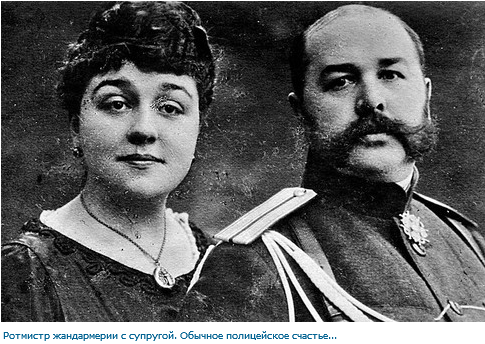
The next victim of Dzhunkovsky was State Duma Malinovsky - Beletsky's most valuable informant. “He was listed as a personal employee of the director of the Beletsky Police Department under the name“ X ”,” recalled Dzhunkovsky. - So time went by while Beletsky was the director of the Police Department; when I managed to part with him and replace him with an immaculate and crystalline purity by a man - V. A. Brun de Saint-Hippolytus, the secret of the department was revealed to me. "
Dzhunkovsky demanded that Malinovsky leave the post of Duma deputy. Under the threat of unthinkable exposure from his superiors, the secret Bolshevik agent went into exile. It all seems fantastic. But it was!
Meanwhile, the main principle that the gendarme officer should be guided in working with his whistleblowers was formulated by one of Dzhunkovsky and Beletsky's colleagues - General Alexander Spiridovich - almost poetically, which, however, is not surprising, considering that Spyridovich was a descendant of a fabulist Krylova: “You, gentlemen, should look at the employee as a beloved woman with whom you are in an illegal relationship. Take care of her like the apple of your eye. One careless step, and you disgrace her. Remember this, treat these people as I advise you, and they will understand you, trust you and will work with you honestly and selflessly ... Never tell anyone your employee’s name, even your superiors. Forget your real last name and remember only by a pseudonym. ”
Spiridovic, like a real cadre gendarme with a lot of experience, warned young officers of the secret police about the psychological breakdown that almost every informant would do: “Remember that in the work of an employee, no matter how dedicated he was to you and no matter how honestly he worked Sooner or later, there comes a moment of psychological change. Do not miss this moment. This is the moment when you have to part with your employee. He can no longer work. It's hard for him. Let him go. Break up with him. Carefully bring him out of the revolutionary circle, arrange him in a legal place, expel him a pension, do everything in the power of man to thank him and say goodbye to him. Remember that by ceasing to work in a revolutionary environment, becoming a peaceful member of society, it will continue to be useful for the state, although not an employee; will be useful already in the new position. You will lose an employee, but in a society you’ll get a friend for the government, a useful person for the state. ”
In no case should one confuse secret officers, whom Spiridovich spoke with such enthusiasm, with ordinary anonymous writers or voluntary informers, reporting on their colleagues to superiors. The statement of a gendarme general belongs to an era when imperial power and revolution fought not for life, but for death. Each informant, literally and not figuratively, risked his head in the event of exposure. The same Malinovsky after the revolution in 1918, was shot by the victorious Bolsheviks, who learned about his work for the police. And Spiridovich is not just an eloquent theorist of gendarme craft, but a combat chief of the Kiev gendarme department. His career took off after being injured in the 1903 year when he was captured by the most dangerous Social Revolutionary terrorist Gershuni.
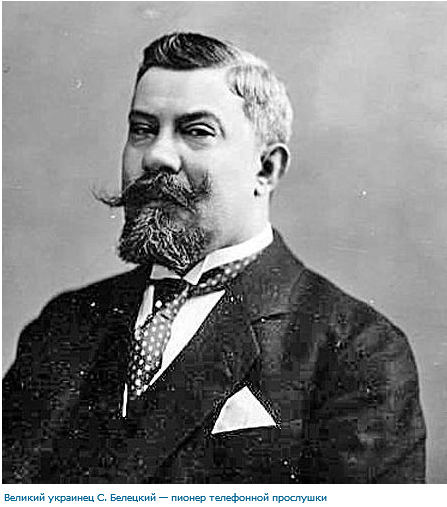
All this Dzhunkovsky, never engaged in operational work and did not recruit in the life of a single agent, just could not understand. As the head of the 12 gendarmes corps, 700 was a man whose duties were to “detect and investigate state crimes”, he did not even know the basics of his service. His appointment was one of the largest personnel errors of Emperor Nicholas II. But neither the king nor the new gendarme did not even realize this.
Dzhunkovsky's next step as head of the gendarme department was no less striking. Russian revolutionaries were looking for personnel for their ranks among gymnasium students and students. They believed that student youth is the most appropriate medium for spreading Marxist ideas — a fuel element of a future revolution. Naturally, the police followed the students. Secret informants were recruited from their own environment. But Dzhunkovsky, who wore a gendarme uniform with silver shoulder straps with the aim, as he said, “to raise the prestige of this uniform” and “try to eradicate everything that caused a hostile attitude towards him”, was a gendarme only in form, not in essence. He ordered to prohibit the recruitment of informants from among students in order "not to corrupt the youth". Now the police did not know anything about the revolutionary activities among young people, but the liberal public still didn’t add to the love of the gendarmes.
However, the payment for such frivolity already waited for Dzhunkovsky for the next turn of the bureaucratic corridor.
Major-General Dzhunkovsky, who led the Gendarmes Corps, demanded that his subordinates dry the wretched tears.
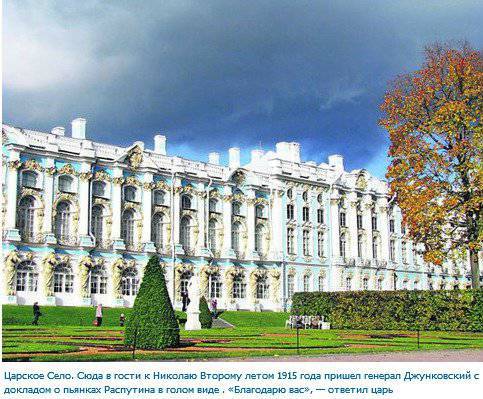
So, on the eve of World War I, at the head of the gendarme corps, by a strange coincidence, was a decent and honorable man - Vladimir Dzhunkovsky. Moreover! I suspect that this was the most decent person in Russia, except for the Emperor himself. He undoubtedly behaved much more decently than revolutionaries and reactionaries than annoyed those and others.
First of all, Vladimir Fedorovich was absolutely satisfied with his place of service and did not look for anything better. Such was his nature. Being a long-time adjutant to the governor of Moscow, Grand Duke Sergei Alexandrovich, he did not take bribes, did not look for officials, did not ask for a raise. Others managed to become regimental commanders by the 40 years, and this one before the 40 years took place in captains and could not even profitably marry. The terrorists of the patron Vladimir Fedorovich would not have killed him, he would have been adjutant until he retired! By God!
Nicholas II, appointed by the governor instead of the killed Dzhunkovsky, also did not let go. He fought fires, brought eggs to peasants in remote villages during Easter, arranged a memorial in Borodino in honor of the 100 anniversary of the famous battle with Napoleon, and not just arranged, but also bought land from local peasants for this memorial. Not for public money, but for your own! Until now, the Museum of the Battle of Borodino exists thanks to the enthusiasm of Dzhunkovsky - a descendant of a simple Ukrainian priest from Poltava, whose ancestors had earned the Russian nobility and managed to break into the empire's elite.
THE KING DROPPED PORTVAIN PERSONALLY. It was the scope and organization of the Borodino jubilee, celebrated in 1912, under the watchful guidance of Dzhunkovsky, and placed the king to it. Nicholas II was looking for loyal and honest people. There was absolutely no dirt on Dzhunkovsky. In addition, his charm and the ability to create an atmosphere of spiritual comfort around him made an irresistible impression on the emperor. The last Russian tsar most of all loved, just such people - who asked nothing and did not create any psychological problems for him.
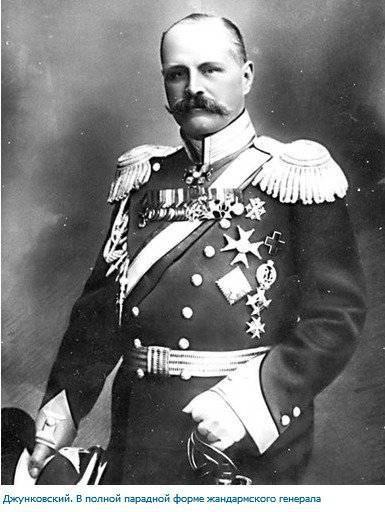
This is how another descendant of the Ukrainian Cossacks, Kiev Governor-General Vladimir Sukhomlinov, managed to reach the heights of power. He knew how to entertain Nicholas II with his jokes and create a feeling of cheerfulness and optimism that the king appointed him minister of war. Moreover, the emperor himself was able to repay faithful servants with the same sincerity. He liked to overturn his glass with Guards officers, often dropping into one regiment or another and staying under endless toasts until late at night. And Dzhunkovsky recalled that shortly before his appointment as commander of the corps of gendarmes, Nicholas II, drinking with him, personally poured his beloved port wine to his drinking companion.
In Petersburg, at the new duty station, Dzhunkovsky led the same modest way of life as before. He always lived in a government-owned apartment, not having his own property, but when he took office, he reminded his subordinates of the words of Nicholas I, who determined the appointment of the gendarme with the following catch phrase: “Wipe tears miserable!”. So, according to legend, this king Benkendorf advised when establishing a gendarme corps in response to the demand of the highest instructions. And Dzhunkovsky, reminding the fighters against sedition this phrase of the founder of their department, solemnly proclaimed: "The sacred covenant of mercy, calling for the tears of accidents to dry up, remains the same motto for each of us!"
The degree of freedom of speech in the then era can be shown by the fact that immediately after this speech of the chief gendarme the newspaper “Morning of Russia” responded to it: “The new chief sang a new song, and the dark depths of the gendarme forest listened to her attentively, thoughtfully. When the last notes were silenced, the forest rustled with all its branches - he answered with his stern voice: “We are listening, Your Excellency. We will try to fulfill. What will sing further VF. Dzhunkovsky, it's hard to say. In any case, a thick dark forest is looking forward to his new orders, and we, the philistines, will try to guess who would remake someone in his own way: the gendarmes of their chief or the chief of gendarmes. ”
Such liberties were unthinkable after a few years, when the ferocious Cheka of the Bolsheviks replaced the complacent royal gendarmerie. Neither the feuilletonist would not have written anything like that before perestroika times about it, nor about the address of the organizations that succeeded the Cheka, the heirs of the GPU, NKVD, MGB and KGB. The freedom of Russia's "Morning" said that in no case was the "dark forest" of the gendarmes. He did not pass sentences, and all the investigated cases brought to the court, and he decided how to punish the robbers and murderers, which in their mass were the Bolsheviks and the Social Revolutionaries. The mildness of the sentences against these figures, the greenhouse regime of Russian prisons, in whose cells Lenin wrote secret notes with freedom with milk, as they told us in childhood, and in Siberia burst whole sheep in the form of cutlets, best of all demonstrate what kind of Russia we lost and what red a monster was built by the villains-internationalists in return for it.
There would be instead of Dzhunkovsky real oprichnik in the blood of the knee, and even better to the waist. But it did not work out - the king was kind, and therefore, he chose soft subordinates. He would turn to historical experience - to recall how Peter the Great personally tortured and even cut off the heads of archers in Red Square. But from the ancestor of Nicholas II there was only simplicity in circulation and not a drop of cruelty. Why, during his lifetime, he was completely unjustly called Bloody, and after his death he was canonized as a saint, which hardly facilitated his work on the throne. The king should not be with a scepter, but with an ax! And to take the scepter in your hand only on holidays - cut the heads of careless boyars and troublemakers, it means that you can relax and instead of a chopper hold a light stick adorned with diamonds.
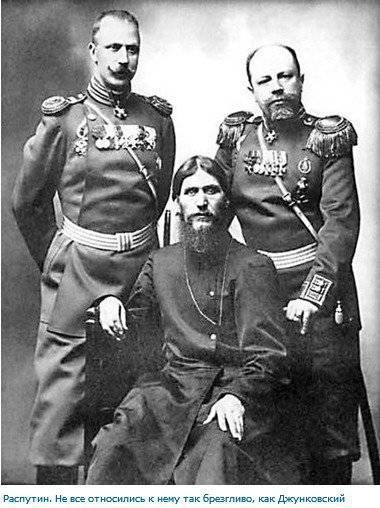
Gave Rasputin In Mordu? Subconsciously, it was just such a king that Russia wanted on the eve of the revolution. And the same royal servants, reminiscent of Peter Prince Romodanovsky at the head of the Order of secret affairs. He also conducted the investigation personally, observing how state criminals open up the soul on the rack. This is evidenced by the rumor that spread throughout St. Petersburg as soon as Dzhunkovsky headed the gendarme department. A rumor read: the new chief gendarme stuffed Rasputin's face.
In Pikul's novel “Unclean Power”, this gossip, walking around the capital, materialized like this: “All documents about the scandal were concentrated in the safe of the chief of the gendarmes Dzhunkovsky; with a report to the king, he came to the emperor's reception office, where he accidentally ran into Rasputin.
- Oh, you are here ... I need you!
Nervous general by all the rules of boxing struck a sharp hook to the iliac. Rasputin opened his mouth in pain, but ... was silent. A swing to the jaw bowed his head to his left shoulder. Dzhunkovsky straight straightened her from below - and she hung on her right shoulder. There was a final uppercut - Rasputin bag down to the floor "...
It is written with pleasure! But nothing to do with reality. The colorful picture is refuted by just one paragraph from Dzhunkovsky’s memoirs. After taking office, he had to go round with visits of all the highest persons: “At the same time with the reception of cases and acquaintance with the personnel, official visits took me a lot of time. In addition, all the persons of the imperial house had to introduce themselves, and among the grand duchess and elder grand dukes to ask for a special reception through the heads of the courts of their highnesses. A few weeks passed until I had time to introduce myself. ” Only the Tsar’s wife, Alexandra Fyodorovna, did not accept the general, saying that he would see him at the Emperor’s report: “I perfectly understood that Her Majesty avoids me, being opposed to me in circles close to Rasputin, especially at that time a rumor spread that I struck Rasputin and pushed him out when he came to me. But it was not true, Rasputin never visited me, and I never met him. ”
The rumor about the beating of Dzhunkovsky by Rasputin related to the very beginning of 1913, when the general-philanthropist only headed the corps of gendarmes. Vladimir Fedorovich still could not collect any compromising material on the “holy line” in order to beat the old man right in the royal reception room. In reality, however, their collision, but not face to face, but in absentia, undercover, occurred only two years later - at the height of the First World War. By that time, Dzhunkovsky felt full force. He got used to the affairs, placed his people in the Police Department and behaved as he understood the purpose of the faithful royal servant.
Rasputin called the old woman. For Rasputin was established secret police surveillance. Reports on his “activities” were constantly laid down by subordinates on Dzhunkovsky’s desk as head of the secret police. Basically, the picturesque scandals and fights of the elder Gregory in various restaurants fell into this dossier. The folder about the adventures of a person close to the royal family was plump, but for the time being Dzhunkovsky closed his eyes to all of this. The patience of a respectable gendarme burst when a report came from a police officer of a Moscow police station, Lieutenant Colonel Semyonov: “March 26, 1915, around 10, went to the Yar restaurant in a strong stage of intoxication Grigory Rasputin. Having occupied a separate office, he called on the phone the editor-publisher of the Moscow newspaper Semyon Lazarevich Kagulsky and invited the female choir. Further, the behavior of Rasputin assumed a completely ugly character. He undressed and continued to talk naked with choir chanters. ”
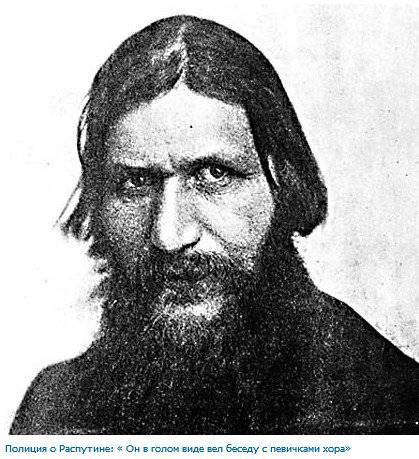
According to the report. Chief of the Moscow security department of the captain Martynov: “Absolutely drunk, Rasputin began to speak frankly with the singer of that kind:“ This caftan gave me an “old woman”, she sewed him. Eh! What would she say if she saw me here now. ” To the question of one of the pevichek, about what old woman he was talking about, Rasputin answered: "About the queen, you fool."
The report of Martynov was addressed personally to Dzhunkovsky. Since information about the ugly behavior of Rasputin, defaming the royal family, has accumulated more than enough, the general went to the report to Nicholas II. He prepared for his visit in the deepest secrecy, saying nothing to anyone except the closest people: “I spent the whole day on June 1 until the evening, writing over the most general note, in which I gave all the facts obtained above and characterizing Rasputin from the most negative side, calling everything by her own name ... By 6 hours of the evening the note was ready, I read it, corrected it and gave to my faithful secretary, Senko-Popovsky, personally rewrite it, then the draft was Noah destroyed - I did not want to dedicate anyone to this business and leave any trace in my affairs. Only Bruin de Saint-Hippolyte, the director of the Police Department, and Nikolsky, the chief of staff of the gendarme corps, were both loyal and deeply loyal to me. I had to introduce the note to the minister, since I did not consider myself entitled to present something to the sovereign without his permission. ” According to Dzhunkovsky, Interior Minister Maklakov, "approved my intention, kissed me and let me go with great excitement."
That was the situation in which Dzhunkovsky was going to report to the sovereign! In the Ministry of Internal Affairs he was escorted simply as a warrior to death. The poor general should have even warned his sister of his “feat”, since “I could easily expect an unfavorable outcome of the report, and I wanted to receive moral support from her”.
Nicholas II received Dzhunkovsky on the same day, June 1 1915, at midnight hours 10 in Tsarskoye Selo. “At first, it seemed to me, incoherently, obviously from excitement,” the general recalled, “I began to report to the sovereign how Rasputin spends time outside Tsarskoe Selo, but then, slowly, inspiring and seeing that the sovereign listens to me attentively, I am bolder He began to report all the evil that Rasputin brings to the dynasties, and by this very fact to Russia. When I finished, the sovereign asked me in a low voice: “Do you have all this, do you have a memorandum?” I answered in the affirmative. "Give me her." The sovereign took it, opened the middle drawer of his desk, and, putting it there, locked the drawer with a key. ”
Dzhunkovsky warned the king that he wrote the note not as the commander of the Gendarme Corps, but personally as a loyalist, that the draft was destroyed by him, but in the inventory of ministerial affairs she does not appear, and suggested “to establish strict observation of all the people visiting Rasputin and those he visits and especially for the persons who submit his petitions to him for transfer to the highest name. ” Nicholas II replied: "I even ask you to do this, but all that you will notice, you will speak to me directly, it will all be between us, I thank you very much."
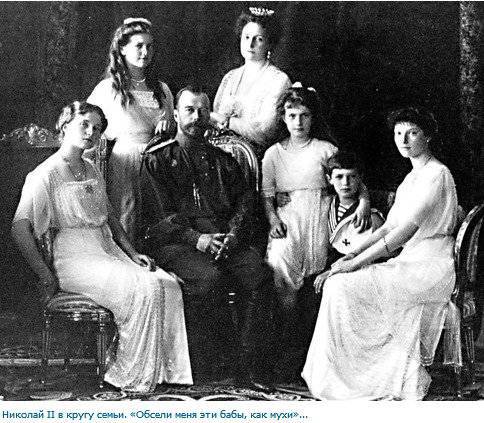
After that, Nicholas II did not let Rasputin into Tsarskoye Selo for two months. But Alexandra Feodorovna convinced him that it was not the old man who was walking at the Moscow restaurant, but his double, sent by the ill-wishers of the “holy man”. The result of all this was the dismissal of Dzhunkovsky from the post of commander of the Gendarme Corps. The opinion of his wife outweighed numerous facts. And the honest general went into the army and took command of a brigade of Siberian shooters.
After the revolution Dzhunkovsky remained in Russia. The Bolsheviks arrested him several times but released him. He met with Dzerzhinsky, who liked to question the former chief gendarme about the secrets of the tsarist regime from a different, counterrevolutionary side. And then cruel times came again, and in 1938, the old general, who was 73-th year, was shot in Butovo, near Moscow. Apparently, he knew too much.
So died the descendant of Hetman Polubotka, who reached heights in the gendarme department, although he himself never dreamed of such a career. The good and naive Vladimir Fedorovich serves as a clear example of the fact that the righteous die as easily as demons, and the ways of the Lord are inscrutable.
Information